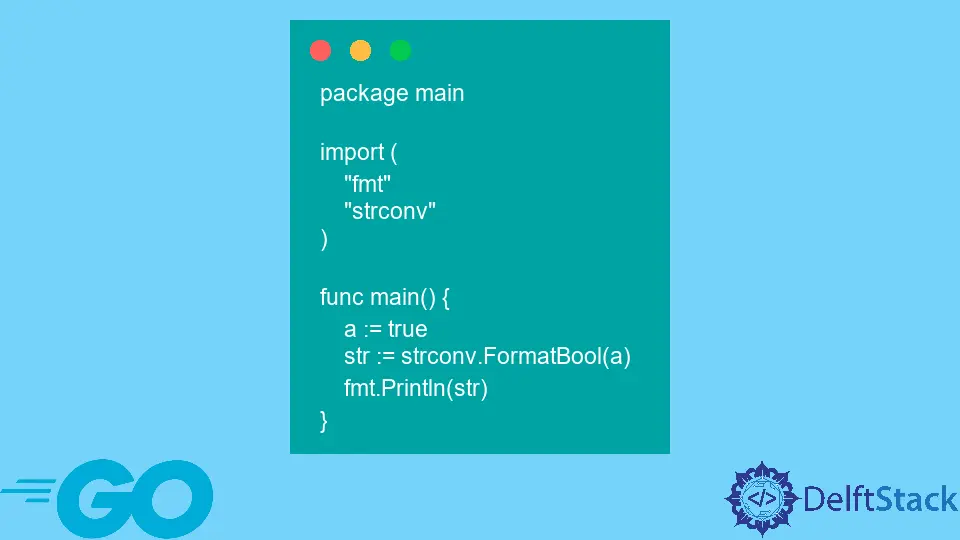How to Convert Boolean Into a String in Go
-
Use the
strconv.FormatBoolFunction to Convert Boolean Into a String in Go -
Use the
SprintfFunction to Convert Boolean Into a String in Go - Using Map to Convert Boolean Into a String in Go
- Conclusion

In Go, converting a Boolean value into a string is a common operation with multiple approaches. This process is crucial when dealing with scenarios where Boolean values need to be represented as strings, such as in data formatting or output generation.
This article will introduce the methods to convert a Boolean to a string data type in Go.
Use the strconv.FormatBool Function to Convert Boolean Into a String in Go
In Go, strconv.FormatBool is a function provided by the strconv package. This function is specifically designed to convert a Boolean value into its string representation.
Basic Syntax:
str := strconv.FormatBool(true)
In the syntax, we convert the Boolean value true to its string representation using the strconv.FormatBool function and assigns the result to the variable str.
Code:
package main
import (
"fmt"
"strconv"
)
func main() {
a := true
str := strconv.FormatBool(a)
fmt.Println(str)
}
In this code, we initialize a Boolean variable a with the value true. Using the strconv.FormatBool function from the strconv package, we convert this Boolean value into its corresponding string representation.
The result is printed to the console using fmt.Println.
Output:
true
The output will be true, reflecting the successful conversion of the Boolean value to its string equivalent.
In the next example, strconv.FormatBool receives a Boolean value as an argument and transforms it into a string.
Code:
package main
import (
"fmt"
"strconv"
)
func main() {
boolVal := true
strVal := strconv.FormatBool(boolVal)
fmt.Printf("Type of strVal: %T\n", strVal)
fmt.Printf("Type of boolVal: %T\n", boolVal)
fmt.Println()
fmt.Printf("Value of strVal: %v\n", strVal)
fmt.Printf("Value of boolVal: %v", boolVal)
}
In this code, we declare a Boolean variable boolVal with the value true. Utilizing the strconv.FormatBool function, we convert this Boolean value into a corresponding string stored in the variable strVal.
We then use fmt.Printf statements to display the types and values of both strVal and boolVal.
Output:
Type of strVal: string
Type of boolVal: bool
Value of strVal: true
Value of boolVal: true
The output reveals that the type of strVal is a string, as expected, while the type of boolVal is a Boolean. The subsequent lines print the actual values, confirming the successful conversion of the Boolean to its string representation.
Use the Sprintf Function to Convert Boolean Into a String in Go
Using Sprintf to convert a Boolean into a string in Go involves utilizing the fmt.Sprintf function from the fmt package. This function allows us to format a string based on a format specifier, and in this case, it can be used to convert a Boolean value to its string representation.
Basic Syntax:
strVal := fmt.Sprintf("%v", true)
In this syntax, fmt.Sprintf is used with the format specifier %v to convert the Boolean value true to its string representation. The resulting string is stored in the variable strVal.
You can replace true with any Boolean variable or expression that you want to convert to a string using this approach.
Code:
package main
import (
"fmt"
)
func main() {
boolVal := false
strVal := fmt.Sprintf("%v", boolVal)
fmt.Printf("Type of strVal: %T\n", strVal)
fmt.Printf("Type of boolVal: %T\n", boolVal)
fmt.Println()
fmt.Printf("Value of strVal: %v\n", strVal)
fmt.Printf("Value of boolVal: %v", boolVal)
}